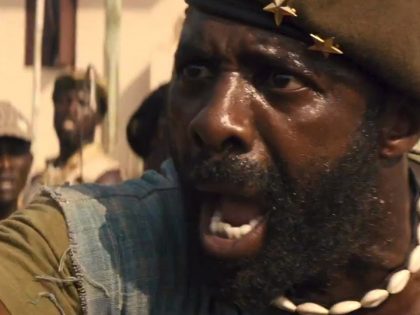The Redemption of General Butt-Naked
A film about former Liberian child soldier, Joshua Milton Blahyi, adds to his celebrity and his reputation as a skilled manipulator.

Stills from "The Redemption of General Butt Naked."
The film, “The Redemption of General Butt Naked,” is an admirable attempt to paint a complex picture of a difficult subject, the former Liberian child soldier, Joshua Milton Blahyi. While I found the film compelling, I couldn’t help but feel skeptical of Blahyi’s intentions, and by extension, the filmmaker’s methods. Blahyi’s infamy originates in the Liberian civil war (for much of the 1990s and early 2000s) in which he became notorious as leader of a band of (literally) naked child soldiers who terrorized many Liberian people. He admits as much during Liberia’s Truth and Reconciliation hearings that he was responsible for the deaths of over 20,000 people. Then during the war Blahyi found Jesus and disappeared from the battlefield. We don’t really know what happened to him during this time.
The film follows Blahyi, now a Christian, as he goes around asking his victims to forgive him–including close associates (he shot a fellow child soldier in the legs for no reason, paralyzing him)–makes money as an itinerant preacher and flees to Ghana after threats to his life from people who doubt his sincerity.
At some level, Joshua is a victim of structural violence. His decision to take up arms was partly to survive during a period in which he, like most other Liberians, had little control over his choices. But the war also presented him with his first taste of power and fame through the manipulations of others.
There are points in the film where we are allowed to empathize with the man and his plight, but it is difficult to escape the feeling that the film just provides him with a vehicle to achieve celebrity and continue his path as a skilled manipulator.
A number of times it seemed like Blahyi was acting, to the point where some scenes even seemed staged.

The viewer gets the impression that Blahyi is using his position as a Christian minister to manipulate his victims and his past as wartime “General” to intimidate them into forgiving him.
A scene in a refugee camp in Ghana where a young man whose family was murdered by Blahyi’s “Butt Naked unit,” is very telling. The actions of the trembling man who probably watched Blahyi kill his entire family was heartbreaking to see as one could sense his fear at the sight of the burly Blahyi. He gave into Blahyi without much of a struggle, unlike the convincing Blahyi had to do with some of his other of his victims.
Joseph Blahyi comes across as the type of individual who thrives off of public attention regardless if that attention is for negative or positive behavior. In this era of reality television shows and global celebrity it’s not hard to see that Blahyi would be easily seduced by the ability to generate fame for himself. (Let’s not forget that through the popularity of an array of reality TV shows like Big Brother Africa, Africans, like everyone else, are very much aware of the power of film and television.) Anthropologist Danny Hoffman has suggested the youthful soldiers of Liberia and Sierra Leone were skilled media manipulators during their respective civil wars, and used international press to their own advantages.

Just doing a quick search on the Internet I found a personal web page that recounts Blahyi’s life story, and has links to buy his auto-biography, which is also for sale in all of Monrovia’s grocery stores. Charles Taylor, the former rebel leader now on trial in The Hague, is almost a household name especially thanks to Hollywood movies like Lord of War (that starred Nicholas Cage) or the presence of celebrities like Naomi Campbell on the witness stand at his war crimes trial.
The role of reconciliation is a key part of Blahyi’s narrative (and the filmmakers’ intentions) as well as key to family and community relations in this part of West Africa, so I can understand while forgiveness would take a prominent role in post conflict healing. That the infamous General Butt Naked received forgiveness is an important lesson for the many former youth soldiers who remain in Liberia, that they two may be able to be accepted back into society. But the reconciliation has to take place in the context of a community that is able to restore social order and with some form of restitution for victims (including civil claims against perpretators).
The film did not fully explore these issues (though it touches on it; it is too obsessed with Blahyi’s own psychosis). We know that the Bishop who saved him played an important role in his transformation, but we don’t see where Blahyi’s influences and elders are today. Who is guiding Joshua Milton Blahyi? And if there is no one, how can we be sure he is serving anyone but himself? These are some questions I would have liked to see answered by the film, and perhaps add an exploration of why the TRC decided to not recommended him for prosecution.
Regardless the film was an important look at the recent history of Liberia and one of its most notorious characters. With steady trickle of similar films currently starting to emerge such as “Fambul Tok,” “Pray the Devil Back to Hell,” and “War Don Don” we will finally perhaps be able to get a more rounded hindsight view at a difficult time during West African history.
- For viewing schedules and other information, check the film’s official website.



